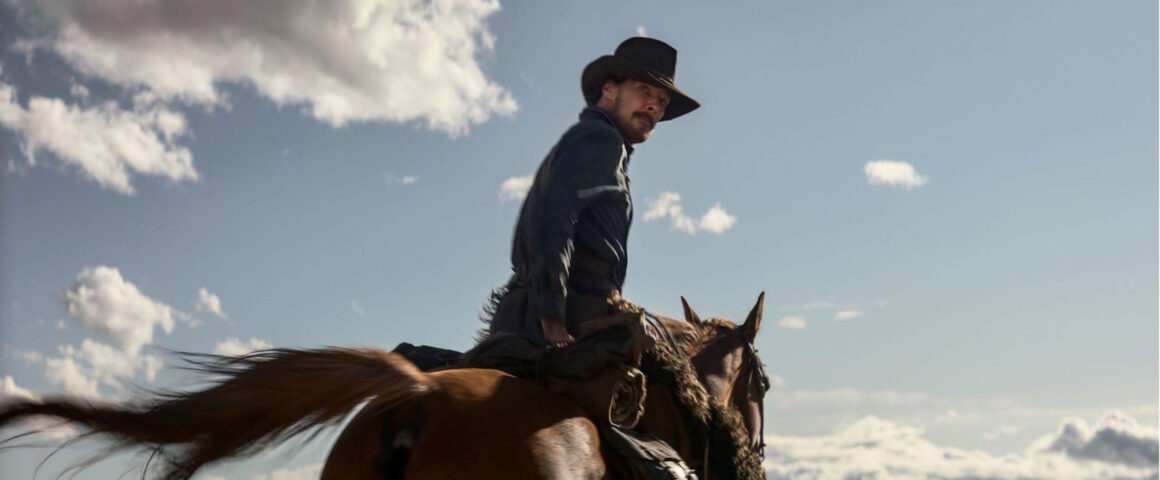“You see, evil always contains the seeds of its own destruction. It is ultimately negative, and therefore encompasses its downfall even at its moments of apparent triumph” — Neil Gaiman
In the opening of the film, The Power of the Dog, Peter Gordon (Kodi Smit-McPhee, “Dark Phoenix”), a Montana cattle rancher’s future nephew, whispers in a Malickian style voiceover, “What kind of man would I be if I didn’t help my mother?” The meaning of the statement, however, is not clear at the time. Directed by Jane Campion, the first female director to win the Palme D’Or in 1993 for “The Piano,” The Power of the Dog (the title borrowed from Psalm 22:20), is a provocative exploration of toxic masculinity and its effect on women and families, a theme that dominated the myth of the old West in American literature and films for half a century.
Based on Thomas Savage’s 1967 novel of the same name, the focus is on the relationship between two brothers, both wealthy ranchers, the overbearing Phil Burbank (Benedict Cumberbatch, “The Courier”) and his laid back brother George (Jesse Plemons, “Judas and the Black Messiah”), his civility a sharp contrast with his brother’s brazen and bullying demeanor. Brother George is the steady and subtle foil to Phil, but the dark and brooding score of Jonny Greenwood heightens the tension and suggests that all might not be well under the surface veneer of normality. There are no truly sympathetic characters in the film, however.
Though Cumberbatch is a recognized British cultural icon, named in 2014 as one most associated with UK culture, his performance as a turn of the century Montana rancher for me was less than convincing, a barrier that ultimately kept me at an emotional distance. The expressive cinematography of Ari Wegner camera beautifully captures the inscrutable loneliness of the Montana landscape (filmed in New Zealand), however, and the far off mountains and isolated miles of empty space hint of an emotional emptiness and failure to communicate.
Stopping at the Red Mill restaurant, the brothers meet Rose Gordon (Kirsten Dunst, “Hidden Figures”), a widow who runs the restaurant together with her lanky teenage son, Peter. Protective and kind, George and Rose begin a relationship that leads to marriage, a union that also brings Peter to live with them on the ranch. Setting his sights on becoming a doctor like his father, (deceased under suspicious circumstances), the ultra-sensitive boy is home from boarding school, his looks and body language a strange fit for a frontier outpost in the 1920s, yet validated by the outstanding performance of the Australian actor McPhee.
Subject to taunts from Phil who calls him “Miss Nancy” and whistles from Phil’s rowdy cowhands, Peter reacts stoically but we are not sure if he is a willing victim or a shrewd manipulator who is biding his time. Honored by a shrine posted on his stable wall, Phil has tender memories of the long dead Bronco Henry, the man he refers to as his mentor who taught him the ins and outs of being a man. Jealous or pretending to be, Phil makes life miserable for both Rose and her son, mocking her attempts to practice the piano by whistling the song she is trying to play and labeling her as a “cheap schemer.” Unable or unwilling to defend Rose, sadly George watches as she falls into binge drinking and her deterioration is difficult to watch.
Even more noxious then before, Phil protects himself by telling dinner guests after he refused to wash before dinner that “I stink and I like it” and, in case anyone is put off by that, tells them that he is a classical scholar who studied at Yale University, a revelation that comes as a shock to the diners, not to mention the viewer. The banjo-playing loner who does not seem to have any friends, close or otherwise, has a private sanctuary near a lake in the woods where he strips, immerses himself in mud, takes a swim, and then lies half naked in the sun. Things suddenly seem to shift in his relationship with Peter, however, after the boy discovers Phil’s private place and stumbles upon the erotic male magazine “Physical Culture.”
They are drawn even closer after the rancher learns that Peter spots the image of a dog barking in the mountains, a talent of which Phil thought he was the sole possessor. Telling him not to let his mom “make a sissy out of you,” Phil takes on the role of Bronco Henry, training Peter in the subtle art of what he thinks will turn him into a man, showing him how to ride a horse, teaching him how to tie a rope, and sharing stories about his mentor, Bronco Henry. Unwittingly, however, he tells him that “obstacles need to be removed,” words Peter takes to heart.
These are words that foreshadow a twist ending in The Power of the Dog that is deeply unsettling.




'Movie Review: The Power of the Dog (2021)' has no comments